Before I climb the next flight of stairs, I decided I needed to pause and reflect on my main inquiry question. Reflection is a key element in the inquiry learning process as it’s about analyzing and making judgments about what has already occurred. Reflection is an active and meticulous considering of knowledge as outlined in “How do I promote student reflection and critical thinking” and the work of Carol Rodgers. In other words reflection is a “meaning-making process that moves a learner from one experience into the next with deeper understanding of its relationships with and connections to other experiences and ideas.” (Rodgers, 2002). This is particularly important in terms of reflection as reflective learners “are aware of and control their learning (and participate) in reflective thinking – assessing what they know, what they need to know, and how they bridge that gap – during learning situations” (“How do I promote student reflection and critical thinking”, 2016).
“How effective is inquiry learning in improving student results in senior secondary?”
The more I think about my inquiry question, the more I realized that it is too specific – the area that it addresses a really narrow part of what inquiry learning is about. What I really want to know about is it engagement with classroom material that drives student performance. The concept of bridging the gap as outlined above is the driving force behind changing my inquiry question.
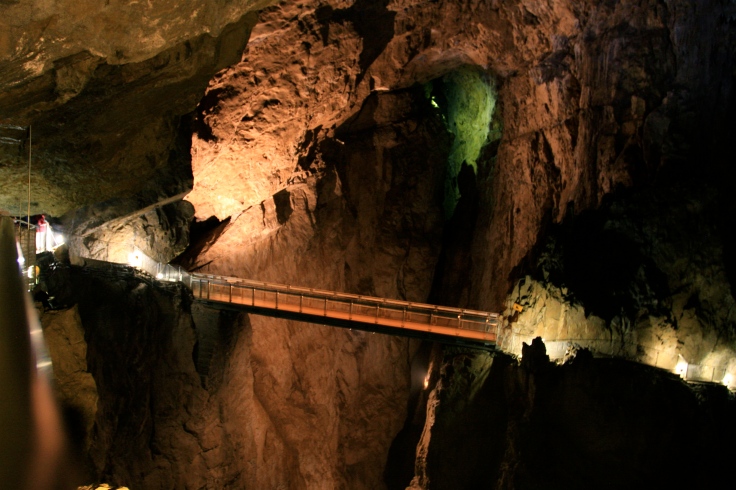
Therefore my new, main focus question is:
“How effective is inquiry learning in improving student engagement in secondary schooling?”
Again I broke this question down into its component parts and examined the possible alternate words that may help me with my search.
Question Breakdown
For my next search I will be using A+ Education. A collaboration between RMIT Publishing and ACER (Australian Council for Educational Research), A+ Education searches over 195 000 resources dedicated to educational theory and practice (Deveson, 2016).
Simple Search
As I have never used A+ Education before I wanted to see how many results I would get with a simple search. After logging in via my University, I tried the simple phrase ?nquiry Learning (as it’s an Australian database I thought the use of the wildcard [?] would make sure my search incorporated both enquiry and inquiry). Using this search I found 3944 results. However, as the search string is quite broad and, as I could not use both the ? symbol and inverted commas to make sure that the terms inquiry and learning appeared together, I very quickly realised I needed to again use Boolean operators to refine my search.
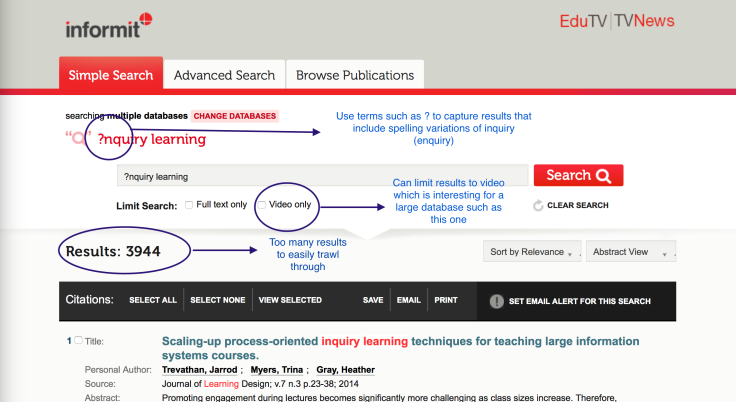
Although my inquiry question has changed somewhat since my search on Google and GoogleScholar, I wanted to see whether searching on A+ education using the same search string would yield similar results. Therefore I chose the closest search string from previous searches that would be useful in determining differences.
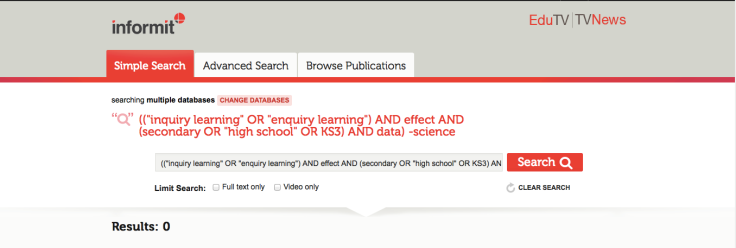
Deciding I needed help, I discovered the A+ Education help pages. In particular I found the tutorial page really useful as their search style is very different to what I’m used to. I also went to their Prepare a Search page as that gives detailed descriptions of what each search parameter does. Using this to help me I again started searching. I used the search string “inquiry learning” AND (effect* OR improv*) AND engag* AND (secondary OR “high school”)
However, this search string only yielded 10 results
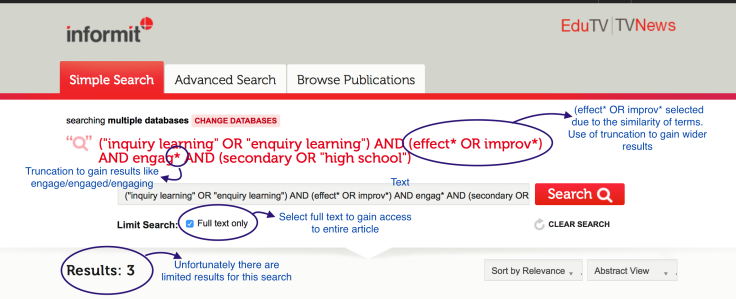
Slightly frustrated I removed some of the search terms. With the shortened version of I now had 19 results, one of which was highly useful to my area of inquiry and the rest were mostly relevant in some way shape or form.
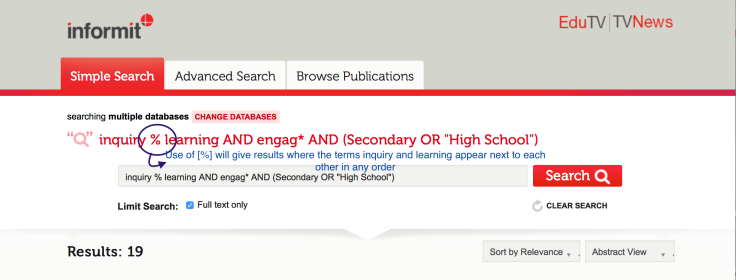
As my question is focused on student engagement, I changed my search string to see if I could find any that directly related to student engagement as many results focused purely on teacher engagement. I also expanded my search by including the term Project based learning as I figured this would also include any overseas studies.
The search string (Engag* AND Student) AND (“inquiry learning” OR “Project Based Learning” OR “enquiry based learning”) -tech* provided 56 results. Of these results many were useful to my line of inquiry. I found the top result Transition to Student voice: Project based learning for wellbeing particularly interesting as the concept of well-being linking to student engagement and results wasn’t one that I had previously considered in the context of inquiry learning.
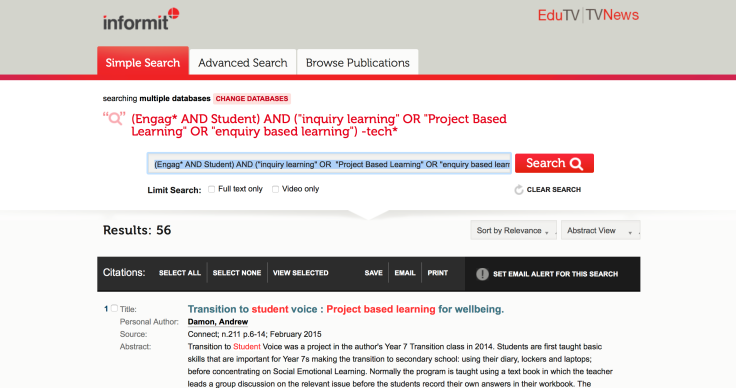
Search Strings |
Results |
Outcome |
Reflection |
| (“inquiry learning” OR “enquiry learning”) AND engag* AND (secondary OR “high school”) |
30 |
An interesting result return including information on creativity and it’s importance in the 21st century and how to measure learning in complex environments | These results are very interesting and, while some are relevant others seem to be looking at learning in a rather more general sense. |
| inquiry % learning AND engag* AND (secondary OR “high school”) |
22 |
Smaller group of results but the % between inquiry and learning should have expanded the parameters for results | Many of these results are repeated from prior searches |
Advanced search
I also wanted to try the advanced search to see if I could find different resources. The advanced search asks the searcher to put in different words and structures the response. My first attempt returned 385 hits. I deliberately didn’t use terms such as KS3 as this is an Australian website and our education system refers to student as either in secondary or ‘high school’.
I refined the search again to see if I could find articles which were about student, rather than purely teacher engagement (although it is really important for Teachers to engage with the learning process as well – something that is often over looked in education).
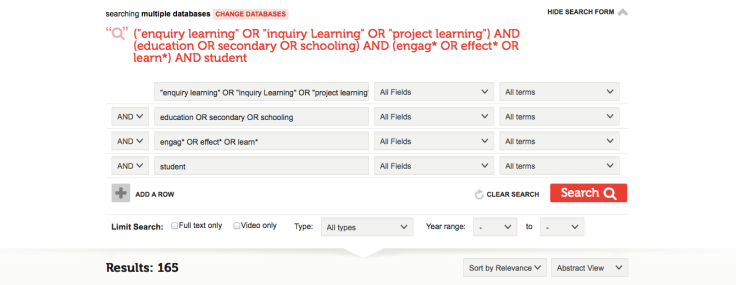
A+ Education also offers a thesaurus in their advanced search.
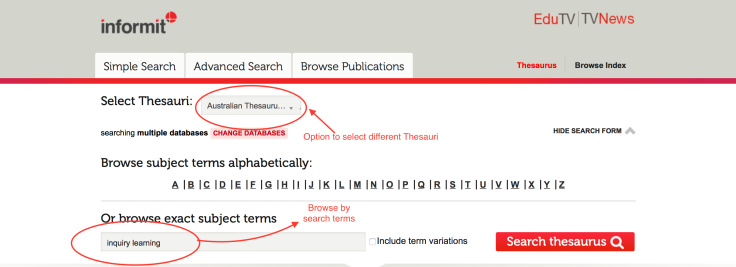
Once I got to know the database search system, and particularly when I started mucking around with their advance search it became easier to find the results that I wanted. So saying, this search engine is not as intuitive as Google or Google Scholar, it also kept timing out which meant that I would have to log back into my University account and then re-enter my search string.
Pros:
Australian based database
Academically based results
Manageable number of results
Useful help and tutorial pages
Cons:
Frequently times out meaning that the user has to log back in again
Not intuitive and therefore accessible only be an intermediary searcher
Fewer search results is not necessarily an indicator of more relevant results
New Questions
- How can you measure engagement levels of students who are undertaking enquiry given social science research issues such as confirmation bias and the halo effect?
- How does inquiry learning engage the ‘average’* student in the learning process?
*average student – the part of the student body who is neither gift nor needing learning support.
Where to from here?
My little climbing philosopher is now reaching the half way mark of the journey. From here it is only a short ascent through Proquest, an entertaining and possibly time sapping endeavor through the searchable elements of social media and then into the sunlight.
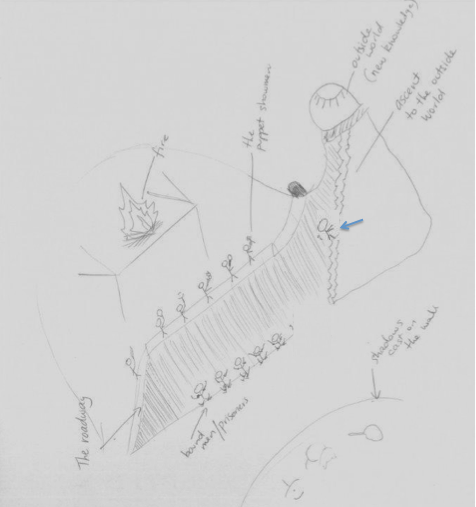
References
Deveson, L. (2016). Informit A+ Education (1st ed.). RMIT Publishing.
How do I promote student reflection and critical thinking. (2016). Hawaii.edu. Retrieved 12 August 2016,
Rodgers, Carol. Defining reflection: Another look at John Dewey and reflective thinking. Teachers college record 104.4 (2002): 842-866.
Featured image: Judge, D. Postojna banner Postojna Cave, Used under [CC BY 2.0]

August 28, 2016 at 1:01 pm
What a great insight into the use of the database A+ Education for your search. Your post is very succinct, and I loved that you have clearly explained the process of your search and the problems you have encountered along the way. I think you have a relevant question here and as a fellow secondary school educator, I am interested in what you have managed to find. I loved your bouldering metaphor! What a great way to engage your audience. Your blog is very user-friendly, and your questions are thoughtful, insightful and very relevant for professionals working within the education system. You seemed to have mastered the expert search strategies! You have some great questions for your next search but am wondering if they are a little bit wordy. Thanks for sharing your post. It is looking fantastic!!
LikeLike
September 1, 2016 at 2:19 pm
Thanks Em, my inquiry questions probably do come across as a bit wordy. I blame 10 years of trying to get Year 11 modern history students to create what complex inquiry questions to fulfil the criteria to get an A.
LikeLike